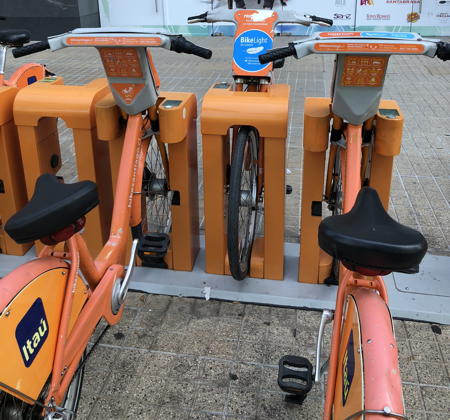Living in Santiago has given me a whole new insight in what life is like for limited English speakers in the U.S.
When your language proficiency is limited, so are your choices.
When I first moved to Chile, I didn’t know any of the neighborhoods, how to use the metro, where to rent a car, or even if I would be able to drive with a U.S. license. I certainly couldn’t read contract in Spanish and wasn’t able to read websites to find an apartment. So, I got a place really near the Start-up Chile offices and co-working space. It was okay. I really wanted a bigger apartment, with a balcony, in a nicer neighborhood but I was limited in my ability to get around and to get information.

My Spanish is still far from perfect but I now know enough to get around the city on the metro without getting lost, to add more money on my metro card, correspond with someone about renting an apartment.

My new apartment doesn’t cost any more than the old one. What I was lacking was not money but knowledge. It’s still an issue every day. My apartment has a combination washer and dryer. It’s one of those weird ones that’s the same machine. I don’t know how to work it and the instructions are in Spanish. On my to-do list this week is to figure that out.

There is a really nice park near here with a long bike path. I want to rent a bike and ride along it but I don’t know how and the instructions are in Spanish. Figuring that out is on my to-do list for tomorrow.
Being limited in a language means being slow
I could pull out my phone with the translation app and type in the words I don’t understand but that means holding up the other people who want to rent a bike. The same thing happened when I was in the grocery store today and didn’t realize I was supposed to write the amount on the bread you bought – or something. The cashier asked me how much it cost and I said I didn’t know “No sé.” She just put the bread aside and charged me for the rest of my groceries. I was holding up the line and it was a really long line.
Fortunately for me, there was a bakery on the way home and I stopped and bought croissants there. They were a lot more expensive than the bread would have been but I didn’t have to tag them with the price myself. This is something that I know happens to people who are limited English speakers in the U.S. as well, they pay more money for goods and services because they can’t shop at lower cost stores where they can’t communicate.
Being Limited in a Language Limits Your Time
Everything in Spanish takes me longer because I have to look up words. When I first got here, my account executive at the bank wrote to me in Spanish and translated if I needed to correspond with someone else at the bank. Now, if I need something she will send me the person’s email and add “You need to write to him in Spanish.” She’s a well-meaning person doing me a favor, nudging me in the right direction. To be legal in Chile, documents have to be in Spanish. All of the time I spend learning Spanish means I’m not doing the things that directly make me money, like getting back to schools interested in using our games, or writing grant proposals or meeting with investors or adding another web page for the new game available for sale – you get the idea.
If you’ve ever asked yourself how people could live in the U.S. for years and not learn much English, that’s how, because they are spending their time working, shopping, cleaning and all of the other things in life. Any time for learning a language comes out of that.
You don’t want your kids to have their world limited, and neither do we.
That’s why we make games that teach math and history, in English and Spanish. Check out Making Camp Bilingual.

